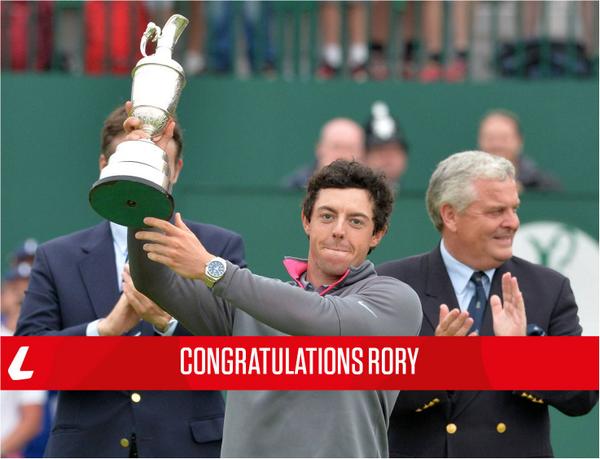The 143rd Open Championship at Royal Liverpool in Hoylake, England.
Northern Ireland's Rory McIlroy kisses the Claret Jug after winning the 2014 British Open Golf Championship at Royal Liverpool Golf Course in Hoylake, north west England on July 20, 2014.
HOYLAKE, England — It is difficult to ask a 25-year-old in any profession, be he athlete or accountant, to accurately project a career path over the next two decades. There is so much to learn, so many decisions to make, so many directions to travel.
And yet that is what Rory McIlroy left us Sunday after his blitzkrieg here. The particulars of his British Open victory are that he shot a final-round 71at Royal Liverpool Golf Club, that he finished at 17-under-par 271, that he beat Sergio Garcia and Rickie Fowler by two and took his third major championship. The Grand Slam? Only the Masters awaits.
“I never dreamed of being at this point in my career so quickly,” McIlroy said.
“Golf is looking for someone to put their hand up and try,” he said. “. . . I want to be that person. I want to be the guy that goes on and wins majors and wins majors regularly, wins tournaments. I’d love to be in that position.”
Northern Ireland's Rory McIlroy holds the Claret Jug as his poses for a photograph after winning the 2014 British Open Golf Championship at Royal Liverpool Golf Course in Hoylake. (Andrew Yates/AFP/Getty Images)
So consider the position in which he stands right now. When Jack Nicklaus won the third leg of the career Grand Slam — the PGA Championship in 1963 — he was all of 23. When Tiger Woods won the 2000 U.S. Open for his third leg, he was 24, and he became the youngest winner of all four majors (in the Masters era) later that summer, when he claimed his first British Open. Nicklaus didn’t complete his slam until he was 26. McIlroy’s first chance will come in April at Augusta, when he will still be 25.
“I don’t see any reason why he’s not going to win there,” said Fowler, also 25, who has played with McIlroy at the Masters. “Definitely fits his game. . . . It’s just a matter of time.”
And let’s be clear about the exclusiveness of the group that has won all four. It does not include Arnold Palmer or Tom Watson, both short the PGA. It does not include Sam Snead, who never won the U.S. Open. Lee Trevino, Walter Hagen, Phil Mickelson — all one leg short.
So the list is five long: Nicklaus, Woods, Ben Hogan, Gary Player and Gene Sarazen.
“I’m looking forward to next April and driving down Magnolia Lane,” McIlroy said, “and trying to complete the career Grand Slam.”
He has but one top-10 finish in six trips to the Masters, but he did lead after each of the first three rounds in 2011. Should he win there, then what?
“We used to say there will never be another Nicklaus,” Mickelson said. “And then along came Tiger. You never want to discount the possibility of someone coming along and dominating.”
To be clear, McIlroy has not yet dominated, not close. His first major, the U.S. Open at Congressional in 2011, portended great things immediately, but he didn’t post another top-10 finish at a major until he won the 2012 PGA Championship at Kiawah. His 2013 was nearly a complete wash-out. When he missed the cut at both the Irish and British Opens, he was at a low point.
“The ability was still there,” McIlroy said. “That wasn’t it. It was just trying to find a way to make it come out again.”
He salvaged something with a win at the Australian Open in November, got engaged to tennis player Caroline Wozniacki over New Year’s, then broke off the engagement two months ago. That very week, he won the BMW PGA Championship on the European Tour. His frame of mind seemed to change.
“I’ve really found my passion again for golf,” McIlroy said. “Not that it ever dwindled, but it’s what I think about when I get up in the morning. It’s what I think about when I go to bed.”
Still, he had to deal with whatever presented itself Sunday, when he woke with a six-shot lead.
“The guys have to come get you,” said Woods, who won his most recent Open here in 2006. “. . . He can afford to play conservatively today. Also, he can afford to play aggressively.”
It was his choice. Given that he took driver at the first, where he made birdie and opened a seven-shot advantage, his tactics were clear: go for it. All week, McIlroy kept two simple words in his head: “process,” for when he faced a tee shot or an approach, reminding himself to make good, clear decisions and crisp swings; and “spot” on the greens, so he could remember to pick out a target and roll the ball over it.
He wavered slightly Sunday, with a “bad bogey” at the par-5 fifth, then another at the sixth. When Garcia, playing a group ahead of McIlroy and Fowler, rolled in an eagle putt at the 10th, he was within two. But McIlroy’s advantage was always there. The tournament never felt in doubt.
“When you know that you can’t make mistakes,” Garcia said, “it’s hard.”
When McIlroy birdied the par-5 16th, it was basically over, and the last two holes became a coronation. When he tapped in for his final par at the 18th, he threw the ball into the stands, hugged J.P. Fitzgerald, his caddie, then Fowler, who shot 67. He then waved his mother, Rosie, onto the green and embraced her as she sobbed.
What next? Fill up the claret jug with red wine and goodness knows what else to celebrate. Beyond that? How can we tell? Rory McIlroy is 25, the golfing world at his feet, his future apparently limitless.


